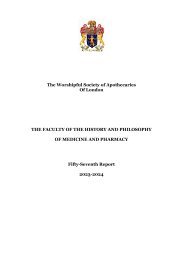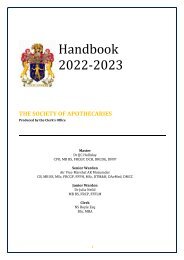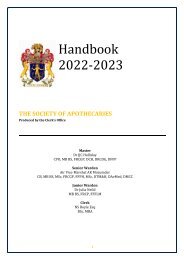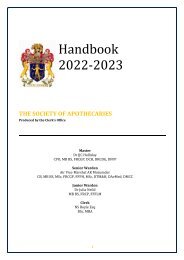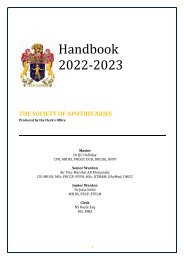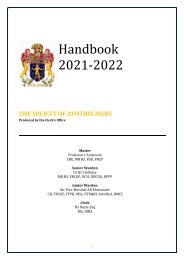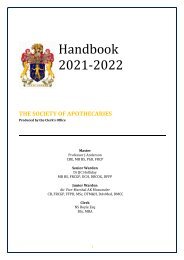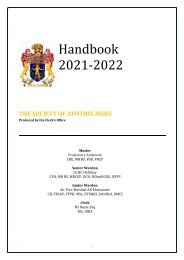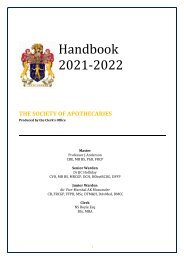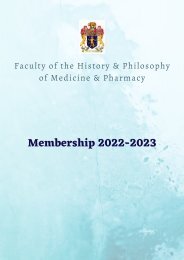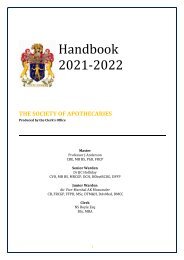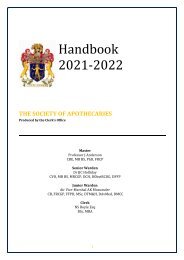Apothercary 2016
Journal of the Worshipful Society of Apothecaries, Society year 15-16
Journal of the Worshipful Society of Apothecaries, Society year 15-16
Create successful ePaper yourself
Turn your PDF publications into a flip-book with our unique Google optimized e-Paper software.
The Master's Chaplain’s Sermon<br />
Master’s Day, 25 September <strong>2016</strong><br />
1 Kings 17:17-24, Luke 8:43 – 48<br />
Firstly I’d like to thank Derek for asking me to be his<br />
chaplain for this year. I’ve already tested the meals in<br />
Apothecaries’ Hall so I know I shall be well fed (it’s an<br />
important part of the discernment process for any<br />
chaplain). But also the invitation has provided me<br />
with the opportunity to explore a little of what you do<br />
as a society, which has been of great interest.<br />
I also think in Derek you will have a hard working<br />
and wise Master. He has vast and varied experience in<br />
his profession. His unassuming and steady manner<br />
will guide and serve you well.<br />
I do not have a scientific or medical background,<br />
but I did act as chaplain to the UK fundraising office<br />
of the charity Mercy Ships for a few years. You may<br />
have heard of this charity, they operate the world’s<br />
largest hospital ship, infact are in the process of<br />
building a brand new one. This floating hospital<br />
spends most of her time on the West coast of Africa<br />
offering free surgery and medical care to some of the<br />
world’s poorest people. They specialize particularly in<br />
maxillofacial and ophthalmic surgeries as well as<br />
other general medical procedures. Staffed entirely by<br />
volunteers - doctors, nurses, dentists and a whole host<br />
of extras make up the ship’s crew, people give two<br />
weeks, two months, two years and in some case over<br />
two decades of their time and skill for free, in what is<br />
an amazing place of healing and kindness.<br />
And one thing I learned in my time as chaplain to<br />
them, and I witnessed first hand on the occasion I was<br />
able to visit the ship in Togo, was something you will<br />
all know – that healing is rarely just physical – that ill<br />
health has most often a social, emotional, economic,<br />
sometimes political edge – and that the gift of<br />
medicine and skilled practitioners has the potential to<br />
transform not only physical health, but also restore<br />
livelihoods, relationships and mental wellbeing.<br />
I witnessed this whilst watching simple cataract<br />
surgery and surgery correcting a child’s squint. The<br />
strength of the sun in that part of the world, combined<br />
with constant dust in the air, and lack of early<br />
intervention meant cataract patients were literally<br />
blind. They would queue up in the morning and be<br />
admitted on to the ship, each one clinging on to the<br />
back of the other, their feet fumbling along the gang<br />
way.<br />
The skill of a surgeon’s fingers fascinated me, how<br />
transformation can happen with just the smallest of<br />
movements, and about 20 minutes in surgery led to<br />
the return not only of sight, but also of livelihoods.<br />
And the boy who I watched have his squint corrected<br />
was able to return to a village where his mother had<br />
been told she must throw him out, because he was<br />
seen as having an evil eye that would curse them all.<br />
And I saw this whilst having the privilege to share<br />
in a ceremony held regularly for women who had<br />
received fistula-corrective surgery. The constant<br />
leakage of urine caused them great embarrassment<br />
and stigma.<br />
One woman told me how her husband had taken a<br />
new wife. When she was very sick even her children<br />
were not allowed to help her. Another woman spoke<br />
about having lived with the condition for 20 years and<br />
the smell that people complained of.<br />
A third woman spoke of her traumatic experience<br />
of childbirth. ‘They thought I was dead’, she said ‘and<br />
they took me outside the village to bury my body. It<br />
was only when I started shaking that they knew I was<br />
alive’.<br />
But these women who knew not only physical<br />
suffering but also social stigma, before they leave the<br />
ship – are dressed in the most beautiful new clothes.<br />
Someone styles their hair and wraps colourful fabric<br />
7



